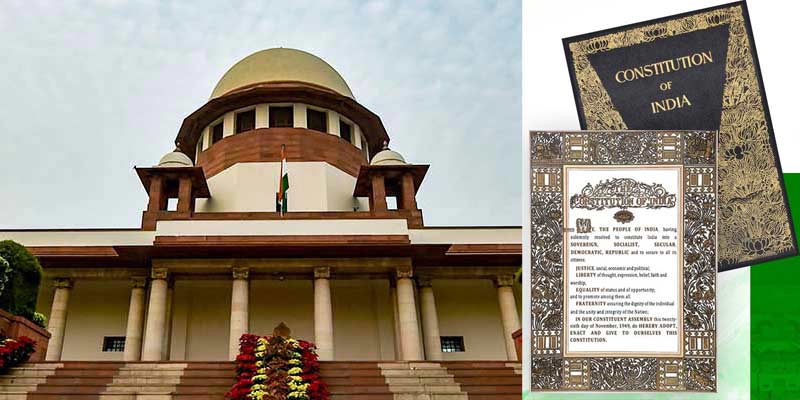- India
- Nov 26
- Kevin Savio Antony
Supreme Court junks pleas against ‘Socialist’, ‘Secular’ in Preamble
• The Supreme Court dismissed the pleas challenging the 1976 amendment to the Constitution adding terms ‘Socialist’, ‘Secular’ and ‘Integrity’ to the Preamble.
• Rejecting the pleas on grounds, including the delay of over 44 years, the Supreme Court said terms like ‘Socialist’ and ‘Secular’ were integral to the Preamble.
• The words ‘Socialist’, ‘Secular’ and ‘Integrity’ were inserted into the Preamble to the Constitution under the 42nd constitutional amendment moved by the Indira Gandhi government in 1976.
• The order observed Article 368 of the Constitution permitted its amendment.
• The power to amend unquestionably rests with the Parliament. This amending power extends to the Preamble, the bench highlighted.
• While it is true that the Constituent Assembly had not agreed to include the words ‘Socialist’ and ‘Secular’ in the Preamble, the Constitution is a living document, as noticed above with power given to the Parliament to amend it in terms of and in accord with Article 368, it said.
• Commenting on the term ‘socialism’, the order said in the Indian context, it should not be interpreted as restricting the economic policies of an elected government of the people’s choice at a given time.
• The top court said the amendments to the Constitution could be challenged on various grounds, including violation of the basic structure of the Constitution.
Key facts about the Preamble:
• The term ‘Preamble’ refers to the introduction or preface to the Constitution.
• It contains the summary or essence of the Constitution.
• The ideals behind the Preamble were laid down by Jawaharlal Nehru’s Objectives Resolution, adopted by the Constituent Assembly on January 22, 1947.
• The Preamble to a written Constitution states the objects, which the Constitution seeks to establish.
• It also promotes and aids the legal interpretation of the Constitution, where the language is found to be ambiguous. Therefore, for a proper appreciation of the aims and aspirations embodied in our Constitution, we need to turn to the various expressions contained in the Preamble.
Components of the Preamble
• Source of Authority: The Preamble establishes that the authority of the Constitution derives from the people of India.
• Declaration: It declares India to be a sovereign, socialist, secular, and democratic republic.
Objectives:
• The Preamble aims to secure justice, liberty, and equality for all citizens.
• It promotes fraternity to maintain national unity and integrity.
Adoption Date: The Preamble mentions the date of adoption as November 26, 1949.
Key Terms in the Preamble
• We, the people of India: Indicates the ultimate sovereignty of the people of India. Sovereignty means independence from external control.
• Sovereign: India has independent authority and is not subject to external power. The legislature has the power to make laws, subject to certain limitations.
• Socialist: Achieving socialist goals through democratic means, supporting a mixed economy where both private and public sectors co-exist. Added by the 42nd Amendment in 1976.
• Secular: All religions receive equal respect, protection, and support from the state. Added by the 42nd Amendment in 1976.
• Democratic: The Constitution derives its authority from the will of the people expressed through elections.
• Republic: The head of the state is elected by the people. In India, the President is the elected head of state.
Objectives of the Indian Constitution
• Justice: Ensures social, economic, and political justice through Fundamental Rights and Directive Principles of State Policy.
• Social Justice: Aims to eliminate discrimination based on caste, creed, gender, religion, etc.
• Economic Justice: Ensures no discrimination based on wealth, income, or economic status. Promotes equal pay for equal work and equal opportunities.
• Political Justice: Guarantees equal, free, and fair participation in political opportunities.
• Equality: Ensures no special privileges for any section of society. Everyone is equal before the law and has equal opportunities.
• Liberty: Guarantees freedom to choose one’s way of life, political views, and behavior, within the limits set by law.
• Fraternity: Promotes a feeling of brotherhood and unity among people, fostering dignity and solidarity within the nation.
(The author is a trainer for Civil Services aspirants.)

